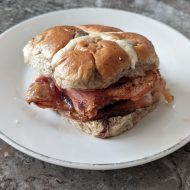It seems that one of the big stories doing the rounds on the ‘blogs today is the dumbing down of childrens’ chemistry sets.
When I was growing up as a kid, I remember begging for a chemistry set one Christmas, at the time the holy grail of chemistry sets was the Salters Science Chemistry Set 5. A large vile-green box packed full with everything you needed to split water into hydrogen & oxygen, strips of magnesium ribbon to blind yourself with when you stare at it burning and more copper sulphate than you can eat.
Of course I never actually got set 5. I was given set 2, which came with the same manual as set 5, but had a slip of paper telling you the contents of set 2 would not let you perform the experiment in the book beyond page 30 or so. It did also come with a nice order form so you could purchase chemical refils and seperate parts to upgrade set 2 to sets 3-5. Chemicals were about 15p per tube, the most expensive piece of glasswear ran to about five pounds.
I never did get set 5, but looking back over the manual I’ve saved these many years I realise that there was nothing too spectactuar you could do. The the most dangerous things in the set were magnesium ribbon and some chemicals for making chlorine gas.
Three years ago I was bought another chemisty set as a joke gift (I left the physics dept to join the chemistry dept). Nowhere in the manual did it make any mention of a more advanced set being avaliable – infact there was no more advanced set – this was the best it got. It contained about a half dozen test tubes, a small spirit burner and 8 chemicals. There was the obligatory copper sulphate, two dyes, iron filings, some citric acid and a few other odds and sods. There was nothing ‘fun’ in there. Not even any fun experiments listed in the manual.
If I’d had been given that set as a kid, I’d have felt conned. You can do many more fun and educational things with the contents of your kitchen cupboards. I used to know a couple of people that did chemistry at home – plating metals, coating mirrors, trying to find fun stuff in coal-tar. The don’t any longer, it is next to impossible for a private individual to get chemicals at home.
Chemistry teaching at schools, well science teaching in general, seems to be crap now. So where will the next few generations of scientists get turned on to science of not at home or school?

We had a conversation about this not to long ago I think. I remember being disapointed with my chemistry set as well, but that may have been more to do with my expectations than any lack of anything “fun”
I was amazed to find out that schools these days don’t even disect animals, to me that was one of the best parts of class.
Do you think it’s down to the “nanny state” these days?
Sadly, although I lusted for a chemistry set, I was never allowed to have one. Air rifles? No problem. Knives? Ditto. Cans of petrol. No-one batted an eyelid. But could I have a chemistry set? Nope. So I used to find things like jars of potassium permanganate (BP) in the bathroom and read with glee instructions like “Do not mix with flammable materials”.
Anyway, I think it’s sad if the sets are dumbed down, but I doubt it will stop any kid with spirit blowing himself up if he wants to. For me, I used to love that school experiment where you would add some sort of acid to a beaker of sugar, causing it to bubble, reek, go black and push itself out the top of the container. What was all that about, I wonder?
Quink: I had no problems getting the chemistry set, but when I wanted a saw I couldn’t have one. I had to make do with an old break knife to cut wood. I was more of a danger to myself with that than I’d have been with any kind of saw.
Good old potassium permagenate is still a source of fun for me. Permagenate and glycerine is still one of my favourite household-chemical experiments. The flame you get is a wonderful purple colour. Sulphuric acid and sugar is the reaction you mention – that’s one all schools seem to demo because of the wow factor. It has next to no real use though. The concentrated acid just dehydrates the sugar leaving the carbon behind.
I’m glad that’s the sugar experiment cleared up. Pretty much the only thing I remember clearly from Chemistry – I lost interest rapidly as soon as moles and valences heaved on to the scene – was the continual injunction from my chemistry master to hold beakers with our little fingers supporting the bottom. Makes accidents less likely, apparently, and it’s now so ingrained that I always hold my pints like that.